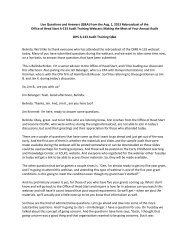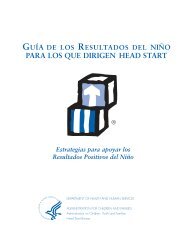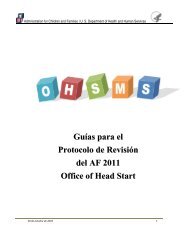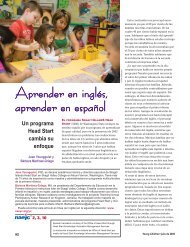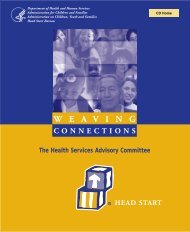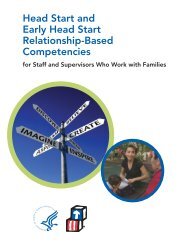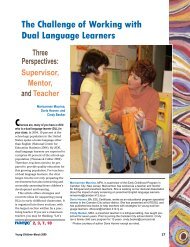Professional Development - Head Start - U.S. Department of Health ...
Professional Development - Head Start - U.S. Department of Health ...
Professional Development - Head Start - U.S. Department of Health ...
You also want an ePaper? Increase the reach of your titles
YUMPU automatically turns print PDFs into web optimized ePapers that Google loves.
Resources<br />
PROFESSIONAL DEVELOPMENT GLOSSARY<br />
These <strong>Pr<strong>of</strong>essional</strong> <strong>Development</strong> terms listed below are part <strong>of</strong> a <strong>Pr<strong>of</strong>essional</strong> <strong>Development</strong> and Knowledge Management<br />
Glossary. The full glossary is available in the Early Childhood Learning and Knowledge Center (ECLKC) at<br />
http://www.eclkc.ohs.acf.hhs.gov/hslc/<strong>Pr<strong>of</strong>essional</strong>%20<strong>Development</strong>/Organizational%20Developmen<br />
t/Cultivating%20a%20Learning%20Organization/prodev_fts_00060_041307.html.<br />
Capacity Building:<br />
Activities that increase an individual’s, population’s or community’s ability for growth, development, or accomplishment.<br />
Community <strong>of</strong> Interest (COI):<br />
A group <strong>of</strong> people both within and outside an organization who share knowledge and experiences around a common<br />
business or pr<strong>of</strong>essional interest. They are driven more by learning and less by outcomes than a Community <strong>of</strong> Practice<br />
(see below).<br />
Community <strong>of</strong> Learners (COL):<br />
A network <strong>of</strong> people who share common interests. They establish relationships, work and learn together, and develop and<br />
share their knowledge. Members may be similar or multi-disciplinary. Some communities may be small and localized; others<br />
will be geographically dispersed ‘virtual communities’ communicating primarily by telephone, e-mail, online discussion<br />
groups and videoconferencing.<br />
Community <strong>of</strong> Practice (COP):<br />
A group <strong>of</strong> people who share and develop their knowledge in pursuit <strong>of</strong> a common purpose or task, even though they<br />
do not necessarily work in the same department or organization. They are motivated more by outcomes than a<br />
Community <strong>of</strong> Interest (above).<br />
ELearning:<br />
The use <strong>of</strong> electronic information systems (especially Internet technologies) to deliver learning and training.<br />
Knowledge Center:<br />
A place where knowledge is gathered and stored that can be accessed and used by other people. It may be a physical<br />
place like a library, a ‘virtual’ place like an interactive Web site or an online discussion board, a place where people<br />
gather‚ or an informal meeting room or discussion area created to encourage knowledge sharing.<br />
Knowledge Management (KM):<br />
The explicit and systematic management <strong>of</strong> vital knowledge and its associated processes in pursuit <strong>of</strong> organizational<br />
objectives, such as creating, gathering, organizing, diffusing, using, and exploiting.<br />
Lessons Learned:<br />
Lessons learned are concise descriptions <strong>of</strong> knowledge derived from experiences that can be communicated using<br />
mechanisms such as storytelling or debriefings or summarized in databases. These lessons reflect on what was done<br />
<strong>Head</strong> <strong>Start</strong> Bulletin 51



